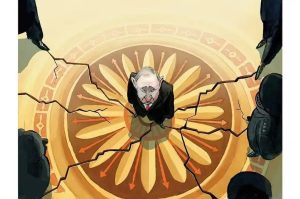Aficionados of zombie films will know that some ghouls just won’t stay dead. In 2013, the economist Paul Krugman came up with the concept “zombie ideas” — propositions that have been refuted, and should be no more, but keep returning because they serve a political purpose, or appeal to people’s prejudices.
In the run up to Russia’s invasion of Ukraine, I experienced some of the symptoms associated with Havana syndrome myself
In March this year, US officials will have hoped that a well-known zombie idea, Havana syndrome, had finally been killed off. Havana syndrome is the name for a group of unexplained medical symptoms which have been reported by hundreds of government officials and their families in locations around the world in the last few years. Sufferers describe unexplained dizziness, headaches and ringing ears. The first case was reported in Cuba in 2016. Many of those affected believe a foreign actor using an exotic weapon caused their injuries. Theories centered around a “microwave radiation” device, which supposedly shoots brain-damaging invisible rays at its targets. After investigating Havana syndrome for five years, in March the National Institutes of Health found “no unusual pattern of injury or disease in the brains of people with the mysterious cluster of symptoms.”
Those Americans who believe themselves to be victims of attacks by a foreign adversary remain frustrated that their government doubts them, and they refute suggestions that their injuries could be related to stress, illness or mass psychogenesis. Many vented to CNN last week. “There is so much anger among the victims right now,” said Marc Polymeropoulos, a former CIA officer and Havana syndrome “victim” himself. The NIH report came a year after the director of national intelligence published analysis that six US intelligence agencies had concluded (to varying levels of confidence) that it was “very unlikely” or “unlikely” that a foreign adversary was responsible for Havana syndrome-related symptoms. Instead, they said “medical, environmental, and social factors” plausibly explained many of the reported incidents.
Some of the victims also recently spoke to the Insider, an independent online outlet specializing in Russia-related investigative journalism, which claimed sensationally on March 31, in conjunction with 60 Minutes and Der Spiegel, that it had uncovered evidence linking Havana syndrome to the use of “directed energy” weapons wielded by members of Russia’s notorious military intelligence squad 29155, a team of killers linked to the 2018 Salisbury poisonings in Britain.
The Insider report claimed that the unit, at the behest of Vladimir Putin, had worked on and had been rewarded for developing non-lethal acoustic weapons, and also that in a couple of instances its operatives have been seen at the time and place of an alleged Havana syndrome attack. “That’s when she saw the tall, thin man,” one bit of the report mysteriously reads. The piece is a ripping yarn, full of spycraft. A co-author claimed on X that Russia had the motive, means and opportunity to seek revenge on the many Americans who were working or had worked on the Russian casefile. But extraordinary claims require extraordinary evidence. The Insider investigation shows signs of confirmation bias in which the hypothesis (“The Russians did it”) gets ahead of the evidence — much of which is flimsy, circumstantial or conjecture, or cherry-picked to fit the narrative of a Russian trace.
Let’s start with the motive. Why would Russia only target American diplomats? Why not British, Polish or Ukrainian? If a directed energy weapon was used to “remove capable American spies and diplomats from active service without killing them,” it makes no sense that the alleged Havana syndrome attacks end well before Russia’s full-scale invasion of Ukraine in February 2022, a period in which degrading US and UK intelligence capabilities would have been of critical strategic importance to the Kremlin. You would expect Russia to resume the attacks after the invasion, as western support to Ukraine increased.
Other questions arise. Why would Putin risk highly-trained and presumably scarce assassins to use a weapon which only incapacitates its targets, rather than kills them? Why has there been no forensic trace of the energy weapon or alleged attackers in the US, Europe or across the globe from a group with notoriously sloppy tradecraft? Why only target relatively mid-level US officials and not their principals, nor internal Russian oppositionists and prominent anti-regime exiles? Why no reports of collateral damage to non-diplomats from the alleged attacks? I was the defense attaché in Britain’s embassy in Moscow, advising ministers, Ministry of Defense officials and the ambassador on Russian defense and security matters. Why did Russia not target my embassy colleagues or my diplomatic friends in Moscow, who were so often guinea pigs for Russian secret service attacks? Why did the operatives not target me?
However, the biggest issue with the Insider reporting is the lack of a smoking sonic gun. US scientists disagree about whether directed energy weapons are technically feasible, and if they are, whether they could cause the reported symptoms. After the NIH report, the Wall Street Journal noted “the technical implausibility of building a device that could be easily transported; the lack of any evidence that such weapons were built or used; and the seeming absurdity of a hostile country randomly zapping diplomats and spies with their most advanced weaponry for no discernible reason other than harassment.”
The CIA continues to investigate around twenty-five individuals whose symptoms remained unexplained. For the majority of “Havana syndrome” sufferers, as the DNI noted, more boring causes will likely lie behind their symptoms — for example, stress. Life for any diplomat and their families in a hostile post such as Havana, Moscow or Beijing can be extraordinarily tough. The host nation knows this and tries to make things even tougher through relentless surveillance, both physical and electronic, through intrusion, imposition of petty rules, restrictions on movement, and harassment and vandalism. They do this to wear us down. The daily psychological and physical challenge is exacerbated by reduced staff numbers, isolation, little down-time due to incessant demand from home capitals, and cultural and language barriers.
In the run-up to Russia’s invasion of Ukraine, I experienced some of the symptoms associated with Havana syndrome myself: insomnia, headaches, nausea, anxiety about my Ukrainian friends, listlessness, irritability, difficulty in concentrating, palpitations and fatigue. Support from my wife and colleagues helped very much. In such a difficult environment, or after exposure to it, I can well understand how stress could, under certain circumstances, trigger a individual or collective reaction based on a pre-existing belief of a Havana-style threat — especially if you’re ordered to be hyper-vigilant against it.
The existence of Havana syndrome is useful to many people. It can be used to lobby for more aid to Ukraine, or conversely to bash the Biden administration for not looking after its diplomats. A congressional inquiry (a second one) has been promised. Ambulance-chasing lawyers are circling the victims. Suggestion that Putin’s hand lies behind Havana syndrome also feeds a wider sense of paranoia about an all-encompassing Russian threat, and plays on our fascination with spies, technology, and conspiracies. Havana syndrome staggers on. It will keep coming back.
This article was originally published on The Spectator’s UK website.


























Leave a Reply